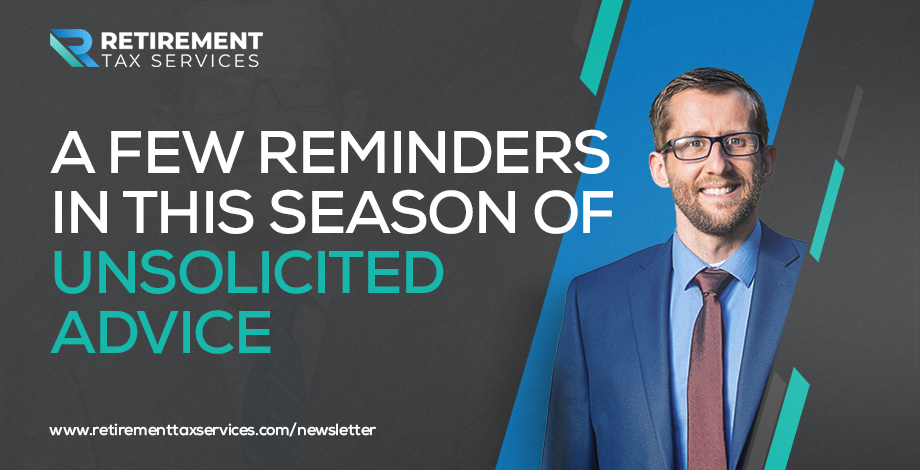
RTS #028 A few reminders in this season of unsolicited advice
It’s that wonderful time of the year where many of us are celebrating holidays and spending time with family and friends. Hopefully, your celebrations are filled with fun and joy…but if you’re anything like us, there will also be no small amount of unsolicited advice thrown around. So we’ve put together some reminders when it comes to unsolicited advice of the tax variety (these might all be old news to you, but your clients might appreciate a nudge):
- Assume the actual amount they saved in taxes is half of what they are claiming. “Show me the tax return” might feel a little aggressive for a family dinner, but unless you see it in writing, proceed skeptically.
- Not having been audited is NOT the same as having done your taxes correctly. The IRS takes years at times to review and audit even the small percentage of returns they ultimately do extra work on. Just because a strategy made it through the automated software checks does not make it valid or legal. There is also no statute of limitations when it comes to tax fraud, so it’s not just a waiting game to see if you make it through the first 3-6 years.
- The rich don’t care what tax planning you know about. Anything that starts with “the strategy the rich don’t want you to know about” is almost guaranteed to be a gimmick or a full-on scam. Make sure you (and, more importantly, your clients) know what to look out for to help identify when something doesn’t pass the straight-face test.
- You need documentation, don’t just “put it on your return”. Just because you don’t have to provide the proof with your original tax return doesn’t mean you can just put whatever you want on your tax return. A great question to ask when someone is recommending a new strategy that doesn’t feel quite right is: “in the unlikely event the IRS asks questions about this, how would I provide evidence it happened?”
- Tax planning is situational, maybe your uncle did save a gazillion dollars in taxes (unlikely), but that doesn’t automatically mean you can. FOMO (fear of missing out) can be a powerful emotion, but tax planning is not one size fits all. Even in the rare event that the incredible tax planning a family member or friend shares with you is 100% legitimate, it might not ever apply to your situation.
- For the majority of taxpayers, good tax planning is about consistently doing the small things over time. Taxes are painful, and many of us pay a whole lot of them. There are ways to proactively save on taxes over time, but it’s not through one-time gimmicks. If holiday conversations stir up motivation to do something about tax planning, channel that into the right areas.
What can you do about it?
Make sure your clients know that you want to be part of EVERY money decision they make. Even though you likely aren’t their tax preparer, regularly remind them that it’s not only NOT an inconvenience, but for you to do your best work, you NEED to be involved in everything they are doing with their hard-earned money. And as a final best practice, no matter how ridiculous the advice they relay to you, make sure your immediate answer is not to scoff, you want to put them back on the right path and create and environment that encourages them to come back to you the next time.
Happy Tax Planning!